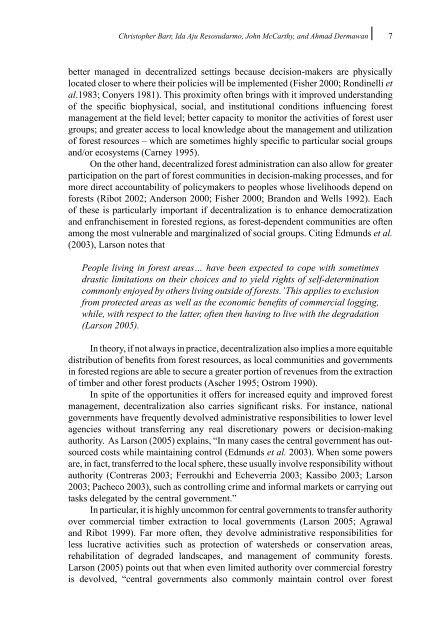Decentralization of Forest Administration in Indonesia, Implications ...
Decentralization of Forest Administration in Indonesia, Implications ...
Decentralization of Forest Administration in Indonesia, Implications ...
You also want an ePaper? Increase the reach of your titles
YUMPU automatically turns print PDFs into web optimized ePapers that Google loves.
Christopher Barr, Ida Aju Resosudarmo, John McCarthy, and Ahmad Dermawan<br />
<br />
better managed <strong>in</strong> decentralized sett<strong>in</strong>gs because decision-makers are physically<br />
located closer to where their policies will be implemented (Fisher 2000; Rond<strong>in</strong>elli et<br />
al.1983; Conyers 1981). This proximity <strong>of</strong>ten br<strong>in</strong>gs with it improved understand<strong>in</strong>g<br />
<strong>of</strong> the specific biophysical, social, and <strong>in</strong>stitutional conditions <strong>in</strong>fluenc<strong>in</strong>g forest<br />
management at the field level; better capacity to monitor the activities <strong>of</strong> forest user<br />
groups; and greater access to local knowledge about the management and utilization<br />
<strong>of</strong> forest resources – which are sometimes highly specific to particular social groups<br />
and/or ecosystems (Carney 1995).<br />
On the other hand, decentralized forest adm<strong>in</strong>istration can also allow for greater<br />
participation on the part <strong>of</strong> forest communities <strong>in</strong> decision-mak<strong>in</strong>g processes, and for<br />
more direct accountability <strong>of</strong> policymakers to peoples whose livelihoods depend on<br />
forests (Ribot 2002; Anderson 2000; Fisher 2000; Brandon and Wells 1992). Each<br />
<strong>of</strong> these is particularly important if decentralization is to enhance democratization<br />
and enfranchisement <strong>in</strong> forested regions, as forest-dependent communities are <strong>of</strong>ten<br />
among the most vulnerable and marg<strong>in</strong>alized <strong>of</strong> social groups. Cit<strong>in</strong>g Edmunds et al.<br />
(2003), Larson notes that<br />
People liv<strong>in</strong>g <strong>in</strong> forest areas… have been expected to cope with sometimes<br />
drastic limitations on their choices and to yield rights <strong>of</strong> self-determ<strong>in</strong>ation<br />
commonly enjoyed by others liv<strong>in</strong>g outside <strong>of</strong> forests.’ This applies to exclusion<br />
from protected areas as well as the economic benefits <strong>of</strong> commercial logg<strong>in</strong>g,<br />
while, with respect to the latter, <strong>of</strong>ten then hav<strong>in</strong>g to live with the degradation<br />
(Larson 2005).<br />
In theory, if not always <strong>in</strong> practice, decentralization also implies a more equitable<br />
distribution <strong>of</strong> benefits from forest resources, as local communities and governments<br />
<strong>in</strong> forested regions are able to secure a greater portion <strong>of</strong> revenues from the extraction<br />
<strong>of</strong> timber and other forest products (Ascher 1995; Ostrom 1990).<br />
In spite <strong>of</strong> the opportunities it <strong>of</strong>fers for <strong>in</strong>creased equity and improved forest<br />
management, decentralization also carries significant risks. For <strong>in</strong>stance, national<br />
governments have frequently devolved adm<strong>in</strong>istrative responsibilities to lower level<br />
agencies without transferr<strong>in</strong>g any real discretionary powers or decision-mak<strong>in</strong>g<br />
authority. As Larson (2005) expla<strong>in</strong>s, “In many cases the central government has outsourced<br />
costs while ma<strong>in</strong>ta<strong>in</strong><strong>in</strong>g control (Edmunds et al. 2003). When some powers<br />
are, <strong>in</strong> fact, transferred to the local sphere, these usually <strong>in</strong>volve responsibility without<br />
authority (Contreras 2003; Ferroukhi and Echeverria 2003; Kassibo 2003; Larson<br />
2003; Pacheco 2003), such as controll<strong>in</strong>g crime and <strong>in</strong>formal markets or carry<strong>in</strong>g out<br />
tasks delegated by the central government.”<br />
In particular, it is highly uncommon for central governments to transfer authority<br />
over commercial timber extraction to local governments (Larson 2005; Agrawal<br />
and Ribot 1999). Far more <strong>of</strong>ten, they devolve adm<strong>in</strong>istrative responsibilities for<br />
less lucrative activities such as protection <strong>of</strong> watersheds or conservation areas,<br />
rehabilitation <strong>of</strong> degraded landscapes, and management <strong>of</strong> community forests.<br />
Larson (2005) po<strong>in</strong>ts out that when even limited authority over commercial forestry<br />
is devolved, “central governments also commonly ma<strong>in</strong>ta<strong>in</strong> control over forest

















